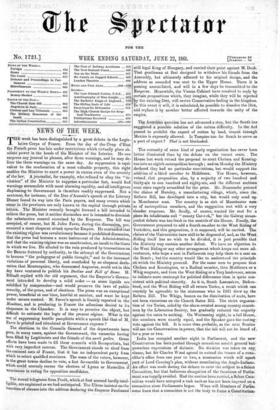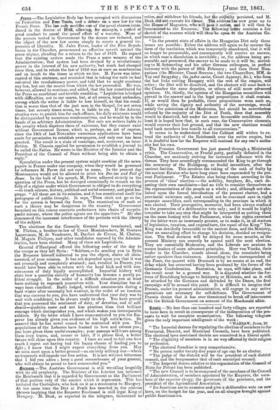India has occupied another night in Parliament, and the new-
Constitution has been pushed through committee amidst general but- powerless expressions of distaste. No division was taken on any, clause, but Sir Charles Wood agreed to extend the tenure of a coun-. cillor's office from one year to two, a concession which will upset: part of Lord Canuing's plan, without conciliating the Anglo-Indians: An effort was made during the debate to refer the subject to a Select Committee, but that ludicrous abnegation of the fuuctions of Parlia- ment was happily avoided. Had the motion been carried, a Select Com- mittee would have accepted a task such as has not been imposed on a committee since Parliaments began. When will Members of Pnrlia, meat learn that a committee is not the body to frame a Coustituticuts plum—The Legislative Body has been occupied with discussions on Protection and hue Nada, and. a debate on, a new law for the French Press. The law only modifies one of the penal clausesintno- duced in the decree. of IS* allowing, for examph4 a period of good conduct to annul the - penal' effect of a warning. gone of; the powers vested in Government by the decree are reduced, and the object of the new law seems simply to create a general im- pression of liberality. M. Jules Favre, leader of the Five Repub- licans in the Chamber,pronounced an effective speech against the press regime, pleading fOr a return to the law of 1819. He argued that the existing system made the Press a mere weapon of the Administration; that system had been devised by a revolutionary power in the interest of his new authority, but much had changed since then, and to retain the law of 1852 was at once as anachronism and an insult to the times in which we live. M. Favre was inter. rupted at this sentence, and reminded that in taking the oath. lie had accepted the revolutionary power, and told that he might condemn any law, but not the source from which the law proceeded. He was, however, allowed to continue, and added, that the law constituted for the Press an exorbitant and terrible condition. "Legislation is hedvd with difficulties, not to say snares, but, at all events, legal ambushes, among which the writer is liable to lose himself, so that his condi- tion is worse than that of the just man in the Gospel, for not seven times, but seventy times seven, he is liable to sin. If the Admini- stration were to punish him for each offence, his daily existence would be distinguished by numerous condemnations, and he would be in the bands of an arbitrary Administration. Not only are writers liable to the penalty which deprives them of existence, but they cannot exist without Government license, which is, perhaps, an act of caprice, since the 24th of last November numerous applications have been made for permission to establish newspapers, and only one has been granted. The result is a state of vassalage, and, moreover, an inter- diction. M. Chassin applied for permission to establish a journal to be called the Nation. He wrote to the Minister of the Interior and the President of the Council of State without being able to obtain a reply." Speculation under the present system might combine all the news- papers in France under one company, when they would be governed by influences M. Fevre did not care to name. In the present day Montesquieu would not be allowed to print his Dec ire and Fall of Rome. In the bulk of his speech, M. Favre adhered strictly to the question of the Press, but he diverged occasionally to remark on the folly of a regime under which Government is obliged to do everything —to teach science, history, political and social economy, and good lan- guage. "All these are in its mission, and it has constituted itself the pedagogue of public thought. It. says, 'Thou shalt not go so far, for the system is beyond thy force. The examination of such or such a theory may be dangerous to the country' Government launched on this course converts prefectures into chairs of encyclo- ptedie science, where the .police agents are the apparitors."' He alao- denounced the incessant interference of the prefects with the liberty of the subject.
The elections for the Councils General have terminated, and M. Plichon, a brother-in-law of Count Montalembert, M. Gustave Laperousse, Made. Vendeurre, M. Durfort de Civrac, M. Chaim, M. Magnin Philipon, and' other candidates opposed by the Adminis- tration7have been elected. Many of them are Legitimists.
General d'Hautpoul offered the following order of the day to- the troops as they left Syria: "Soldiers,—In sending you to Syria the Emperor himself indicated to you the object, above all disin- terested, of your mission. It has not depended upon you that it was not promptly and completely attained ; and, recalled to France, you would have been able to return with the head high and with con- sciousness of duty loyally accomplished. Impartial history will state how a question entirely of humanity has become a purely po- litical struggle. In the midst of a difficult situation you at least have nothing to reproach yourselves with. Your discipline has al- ways been excellent. Badly lodged, without amusements during a bard winter after unusually hot weather, in the midst of an inaction that was onerous to you, you have understood that vour duty was to wait with confidence, to be always ready to obey. You have proved. that you possessed the sentiment of duty, of devotion, and of self- denial—qualities rarer and not less precious than that brilliant courage which distinguishes you, and which makes you incomparable soldiers. By the letter which I have communicated to you the Em- peror has already given you evidence of his high satisfiation. Be assured that he has never ceased to be contented with you. The populations of the Lebanon have learned to love and esteem you ; you have given them useful examples; your passage will leave among them deep traces, and, sooner or later, if it please God, a better future will shine upon this country. I have no need. to tell you how much I regret not having. had the happy chance of leading you to fight ; I know that I might expect everything from you. May we soon meet upon a better ground—an entirely military one—where no trammels will impede our free action. It is not without bitterness that I bid you adieu ; keep a good remembrance of your general, who will always be proud to have commanded you." Strmamt,—The Austrian Government is still wrestling languidly with its old perplexity. The Minister of the Interior has informed the Reiclisrath that it is regarded by Government as the Parliament of that portion only of the empire which it represents. This has irritated the Centralists, who look on it as a concession to Hungary. At the same time the Diet at Pesth has inserted in the address *rases implying that the Emperor Ferdinand is still legal King of Hungary. M. Deak, as reported in the telegram, threatened to
retire, and withdraw his friends, but the majority persisted, and M. Desk did not execute his threat. The address has now gone up to the House of Magnates, who- will pass it entire, and it will then be transmitted: to the Emperor.. The following letter contains a fair sketch of the courses which will then be open to the Austrian Go- ;vernnient
"In the present state of affairs in the Hungarian Diet only three issues are possible : Either the address will again so far assume the form of the resolution which was temporarily abandoned, that it will no longer be presentable, and consequently will receive no answer, in which case a.dissolution. is inevitable ; or, the address being pre- sentable and presented; the answer to be made to it will be, accord- ing to M. Schmerling and his other German colleagues, in perfect harmony with the patent of 26th February ; and then those Hun- garians (the Minister, Count Szecson ; the two Chancellors, MM. de Tay and Szogydny ; thejudex curia; Count Apponyi, &c.), who form the last links uniting Hungary with the- rest of the empire, will 'retire ; the Diet will be dissolved, and the electors will send back to the Chamber the same deputies, or. others of still more' advanced opinions. Or, thirdly, the opinion of the Hungarian councillors will prevail in the answer and in the legal propositions it shall• contain. If, as would then be probable, these propositions were such as,• while saving the dignity and authority of the sovereign, would satisfy the patriotism of the Moderates, but should be nevertheless refused by the majority of the Diet of Pestle then that assembly would be dissolved, but under far more favourable conditions. At least it is hoped here that, in such case, the Conservative• elements would recover their lost ground, and that the new elections would send hack members less hostile to all compromises."
It seems to be understood that the Cabinet still wishes to ex- tend the authority of the Reiclisrath over the entire empire, but it is doubtful how far the Emperor will contend for any one's audios rity but his own.
The Prussian Government has just passed through a Ministerial. crisis. The Conservative, or Feudal party, partially defeated in the Chamber, are anxiously striving for increased influence with the throne. They have accordingly recommended. the King to go through the ceremony of the Huldigung, or feudal investiture, after the ancient fashion. This involves the taking of the oath of fealty by the ancient Estates who have long since been superseded by the pre- sent Parliament. "The Estates also being chosen according to the process of ' class' election— the nobility, burghers, &c., each de- puting their own candidates—had no title to consider themselves-as the representatives of the people as a whole; and, although not abo- lished upon the formal introduction of the present charter, had a provincial existence only, and could not be convened save in eight separate assemblies, each corresponding to the province in which it was elected. Their prerogative, moreover, had been always confincd to the possession of a deliberative vote only; and it would be highly irregular to take any step that might be interpreted as putting them on. the same footing with the Parliament, when• the rights exercised by the latter were so immensely- greater, as to make it, in all matters of legislation, taxation, and expenditure,.the equal of the King." The King was decidedly favourable to the ancient form, and the Ministry,• after an unavailing effort to change- his decision, decided on resigna- tion. The final decision will be delayed for some months, as the present. Ministry can scarcely be spared until the next election. They are essentially Moderates, and the Liberals are anxious -to secure leaders of more advanced principles. Herr vonVineke, their leader in the Chamber, stands almost alone, the remainder being rather speakers than statesmen. According to the correspondent of the Times, the quarrel with Denmark is by no- means at an end, the delay which has occurred having been produced by the forms of the Germanic Confederation. Execution, he says, will take place, and the result must be a general war. It is disputed whether the for- tress of Rendsburg belongs to Schleswig or Holstein, and as it will be attacked by the Germans and defended by the Danes, the first campaign will be around this point. It is difficult to imagine that Prussia, under its present administration, will engage in any active operations not necessary for self-defence. The Government of Prussia denies that it has ever threatened to break off intercourse with the British Government on account of the Macdonald affair.































